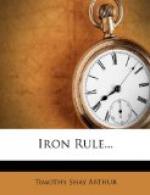The letters were from business correspondents, and in no way affected the position of extremity he occupied. For a greater part of the morning Mr. Howland sat musing at his desk, in a kind of dreamy abstraction. All effort was felt to be useless, and he made none. At dinner time he went home, and sat at the table, silent and gloomy; but he scarcely tasted food. After the meal, he returned to his store—a faint hope springing up in his mind that Edward might have submitted the aid he had asked for so humbly by private hand, or through some broker in the city, and that it would yet arrive in time to save him. Alas! this proved a vain hope. Three o’clock came, and the unredeemed note still lay in bank.
“It is all over!” murmured the unhappy man, as like the strokes of a hammer upon his heart fell the three distinct chimes that rung the knell of his business life.
Taking up a newspaper, and affecting to read, Mr. Howland sat for nearly an hour awaiting the notorial visit, which seemed long delayed. At last he saw a man enter and come walking back toward the desk at which he sat. Not doubting but that it was the Notary, he was preparing to answer—“I can’t take it, up,” when a well-dressed stranger, with a dark, sun-burnt, countenance that had in it many familiar lines, passed before him, and fixed his eyes with an earnest look upon his face. For a few moments the two men regarded each other in silence, and then the stranger reached out his hand and uttered the single word—
“Father!”
“Andrew!” responded Mr. Howland, catching eagerly hold of the offered hand.; “Andrew! my son! my son! are you yet alive?”
The great deep of the old man’s heart was suddenly broken up, and he was overwhelmed by the rising floods of emotion. His lips quivered; there was a convulsive play of all the muscles of his face; and then large tears came slowly over his cheeks. The man of iron will was melted down; he wept like a child, and his son wept with him.
Scarcely had the first strong emotions created by this meeting exhausted themselves, when another person entered the store, and advanced to where the father and son were standing. He held a small slip of paper in his hand, and as he came up to Mr. Howland, he said, holding up the piece of paper—
“Your note for fifteen hundred dollars remains unpaid.”
“I’m sorry, but I can’t lift it,” replied Mr. Howland, in a low voice that he wished not to reach the ear of his son; but Andrew heard the answer distinctly, and instantly drawing a large pocket book from his pocket, took out a roll of bank bills which he reached to his father, saying, as he did so—
“Take what you want. How timely has been my arrival!”
“My heart blesses you, my son, for this generous tender of aid in a great extremity,” said Mr. Howland in a trembling voice, as he pushed back the roll of money. “But a crisis in my affairs has just arrived, and the lifting of this note will not save me.”




